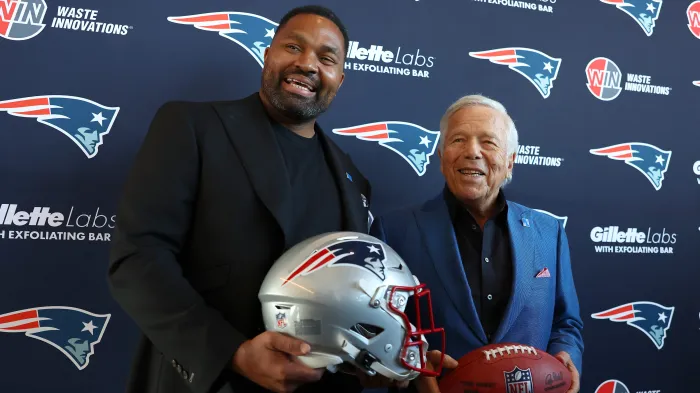
In less than half an hour into their introductory press conference, New England Patriots owner Robert Kraft and newly appointed coach Jerod Mayo found themselves in their first disagreement.
Mayo, in his opening statements, expressed his appreciation for not taking for granted the opportunity to become the Patriots’ first Black coach. During the Q&A session, I inquired about the significance of hiring the franchise’s inaugural Black coach, with Mayo, previously the inside linebackers coach, sharing his thoughts on achieving this milestone.
Kraft responded, “let me say this to you, I’m really colorblind in terms of what I feel like on Sunday when we lose.” The 82-year-old owner emphasized that, beyond family and team, winning is his top priority.
“Winning and the Patriots is my passion. So, I want to get the best people I can get,” he explained. “I chose the best head coach for this organization. He happens to be a man of color, but I chose him because I believe he’s the best to do the job.”
Mayo, however, clarified, “I do see color because I believe if you don’t see color you can’t see racism.” He went on to stress the importance of accepting individuals for who they are and not letting surface-level attributes, such as skin color or disabilities, negatively influence perceptions.
Following the press conference, Kraft briefly elaborated on his decision, emphasizing his desire to hire a Black candidate and ensuring Mayo’s success. Mayo, at 37, becomes the NFL’s youngest coach.
While Mayo’s hiring is a positive development, questions arise about whether it circumvented the Rooney Rule, established in 2003 to require teams to interview at least one woman and one underrepresented minority for senior and coaching positions. The Patriots hired Mayo without considering other candidates for the coaching vacancy, relying on a succession arrangement communicated to the NFL and the Fritz Pollard Alliance in January 2023.
Kraft defended his decision, trusting his instincts and emphasizing the importance of clear succession plans. However, concerns linger about whether such arrangements could perpetuate a historically closed-door practice that favored white coaches.
The Patriots’ move with Mayo contrasts with instances where teams conducted sham interviews to comply with the Rooney Rule. Brian Flores’ lawsuit against the NFL sheds light on such practices. The unique Mayo-Patriots arrangement, while celebrated by some, raises questions about precedent and the potential impact on diversity in coaching hires across the league.
Tony Dungy, the Hall of Fame coach, sees Mayo’s hiring as a reflection of the system’s dynamics. He acknowledges that Mayo’s qualifications and familiarity with the team played a crucial role, but raises awareness about the historical challenges faced by Black coaching candidates.
John Wooten, chairman emeritus of the Fritz Pollard Alliance, applauds Mayo’s hiring as a positive start to the coaching hiring cycle, appreciating the franchise’s commitment to a talented coach.
Mayo’s primary challenge lies in succeeding a coaching legend, Bill Belichick, and revitalizing a Patriots team that struggled with a 4-13 record last season. As Mayo embarks on this journey, his ability to meet expectations and overcome the shadow of his predecessor, coupled with Kraft’s colorblind statement, adds an intriguing layer to the unfolding narrative.
In choosing Mayo as the 15th coach, Kraft and Mayo embark on a journey that holds lessons for both mentor and mentee in the intricate art of coaching.







